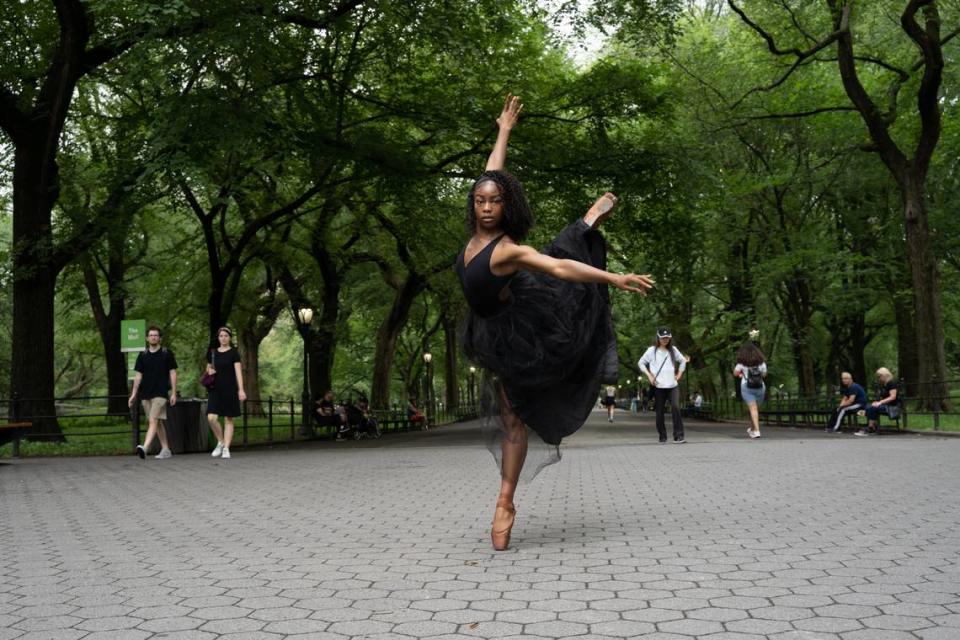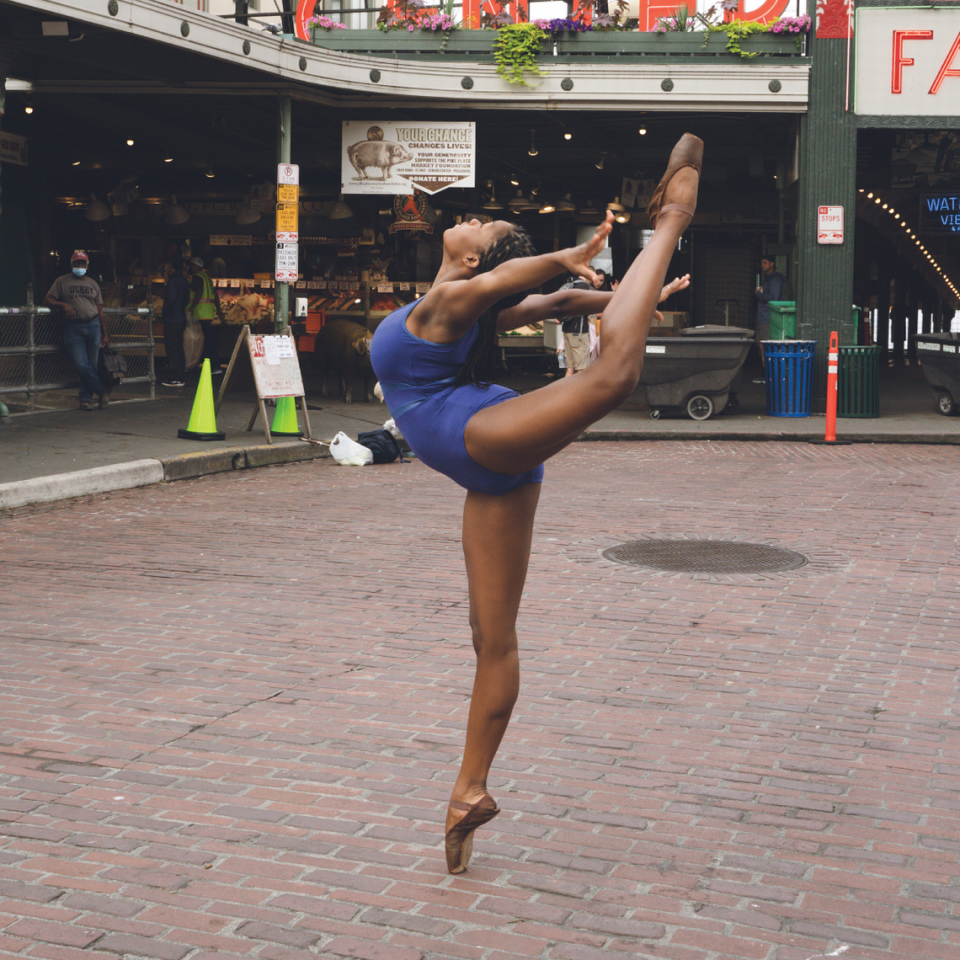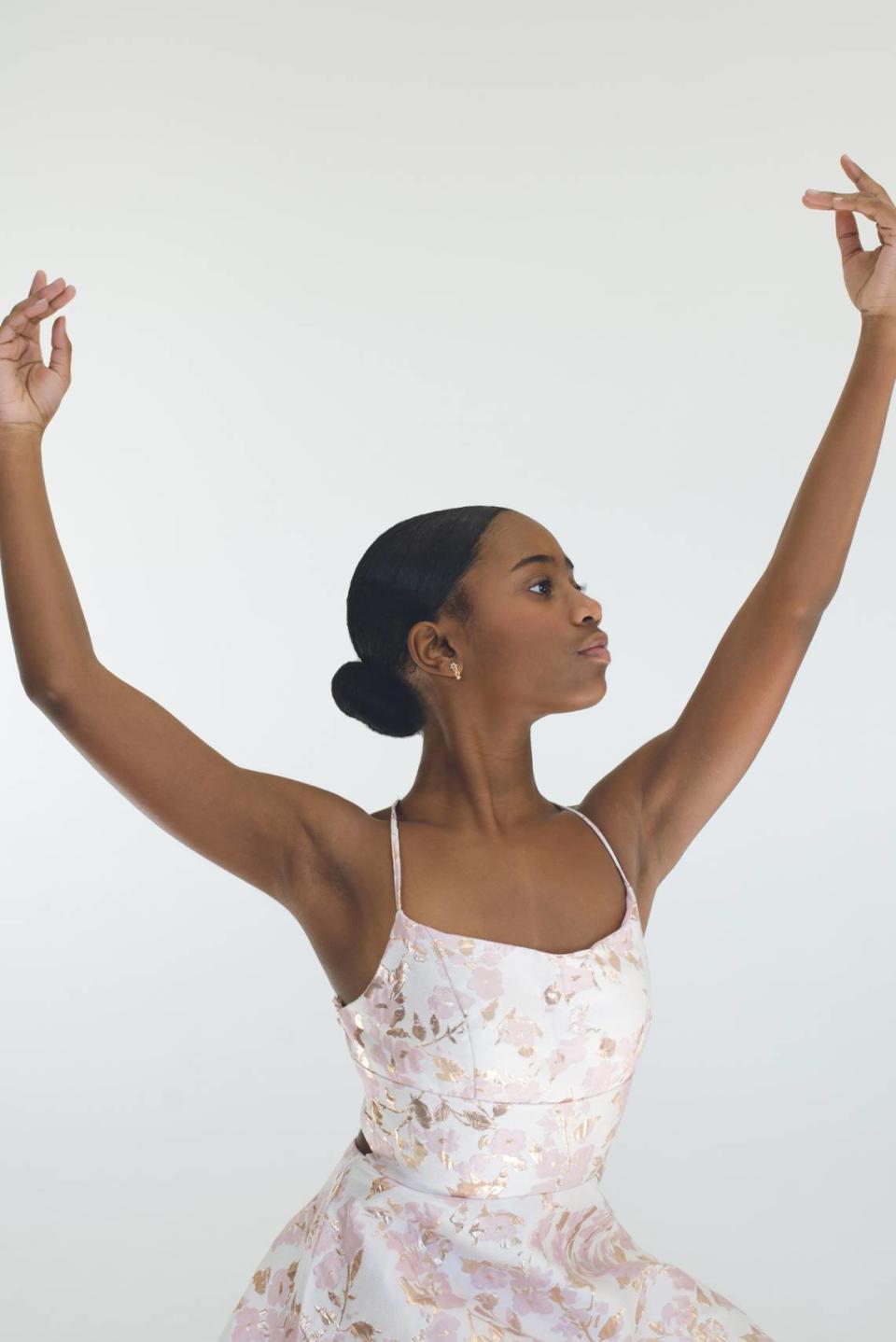How Brown Girls Do Ballet went from a photo project to an international support system
Olivia Bell remembers the first time she saw Black ballet dancers as a child at a performance by the Dance Theatre of Harlem in Fort Worth.
Seeing Black ballerinas on stage with flesh tone tights to match their dark skin was inspiring. Growing up in the Dallas-Fort Worth area, people told her to stick to jazz and contemporary dance, but after seeing the reality of a possible life in ballet, she could not let go.
“It was so empowering to me as a little girl,” Bell said. “I probably don’t think I fully realized why I was so impacted then, but I definitely do now.”
Bell continued her journey in dance at The Dallas Conservatory, in summer classes and by enrolling full time at the School of American Ballet in New York City. She now dances for New York City Ballet’s Corps de Ballet, one of the premier dance companies in the world.
As she considers her success in ballet, Bell is thankful for the Brown Girls Do Ballet program in Fort Worth, which helped her find a community of other Black ballet dancers who shared her experiences. The support system of mentors helped her to ignore the people who told her to give up ballet.
Brown Girls Do Ballet is a nonprofit organization that provides resources to young dancers of color such as scholarships, mentorship, supplies, workshops and other support to help keep them dancing, said TaKiyah Wallace-McMillian, founder and executive director of the organization.
It has served over 200 dancers in the U.S. and abroad and provided over 55 scholarships since 2020 for summer programs or undergraduate studies.
Photo project on Black dancers goes viral
Brown Girls Do Ballet was founded in December 2012 when Wallace-McMillian’s 3-year-old daughter wanted to do ballet. Wallace-McMillian saw there weren’t many girls who looked like her daughter in class, so she decided to do a personal photography project to show her daughter the diversity of Black dancers.
She created a Facebook page and put out a call for dancers of color in the Dallas, Houston and Austin areas. In 24 hours her post became viral with parents who wanted her to come to their city to take photos.
She was overwhelmed by the joy she saw in the mothers she met and how much her project meant to them.
“When you had a mom who’s had a 12 year old who’s only ever been the only little Black girl in the studio, it creates a completely different response,” Wallace-McMillian said. “They are super emotional, and it’s almost like I didn’t realize that this was the reality I placed my child in. But now it’s magnified to me, and I hurt for my baby because I don’t know what she’s been through being the only one in this space.”
After a photo shoot in Austin, a friend told her to take the initiative further to provide help to young girls of color who want to take ballet classes.
After helping one girl pay tuition to attend an intensive summer program, she began to expand with mentorship, scholarships, taking donations of ballet pointe shoes, a supply closet, and other resources.
Mentor program provides support
The Brown Ballerina Junior and Youth Ambassadors mentorship program has helped over 170 girls since 2017. Participants are located around the world, from Canada to Trinidad & Tobago, Ghana and Sydney. Girls are paired with older dancers who are on similar career tracks for a year of mentoring. They also are able to meet a professional dancer once a month to talk and learn.
One of the mentors is Isio-Maya Nuwere, who currently stars in The Lion King on Broadway, and is a New York City native. She said she believes Black women have been underserved and overlooked in ballet because of prejudice. Brown Girls Do Ballet provides a community where Black girls can lean from each other and pursue their dreams even when they feel discouraged, she says.

“I think we strive to have diversity, and I think that is the greatest thing that we would need, not even in the arts but in the world, is to give a Black girl the same opportunity as they would as their counterpart and even the playing field,” Nuwere said.
Destiny Wimpye is a mentor and alum of the program who is from Atlanta and currently dances for the Pacific Northwest Ballet. She says Brown Girls Do Ballet cares about making the ballet world more inclusive for young Black and brown girls. When she was in the program, Wimpye said, she was thankful to have access to people who looked like her and could answer questions when she was struggling.

One mentor taught her how to sew ballet pointe shoes, which can cost between $65-$120 and need to be replaced about every three months. She hopes to provide the same help to another young dancer of color.
“I like being a part of the organization because I want younger dancers to be able to come to me and ask me questions that they might not be able to ask their peers,” Wimpye said.
Program creates sense of community
Allie Francois is from Baldwin, N.Y., and became interested in ballet when she was 5, though she did not take it seriously until she was 10. She learned about Brown Girls Do Ballet through Instagram and fell in love with the community around the program. There aren’t many ballet dancers of color to look up to, Francois said, so having a community of people who could support you at all times was important.

“Being a part of Brown Girls Ballet has helped me become a leader for little girls who are just like me,” Francois said. “I’ve learned I can share my gifts with others and give back to those who helped me get to where I am today and where I will be in a couple years. Support is a big aspect of dance, and it is imperative that these dancers of color are receiving it.”
Lillian Wamsley, 14, is from Dallas and says ballet provides her with a sense of freedom to escape from the stress of everyday life doing what she loves.
She wants Brown Girls Do Ballet to grow to provide more opportunities for future brown ballerinas.
“It is important to be around other girls of color who also do ballet because I am able to connect with dancers who look like me,” Wamsley said. “We support one another. We share the struggles and challenges of being a brown ballerina. For example, brown tights, pancaking pointe shoes, and embracing all body types.”
Wallace-McMillian, the founder of Brown Girls Do Ballet, says there will always be a conversation about early experiences for children interested in ballet as the cost of these experiences rises every year. She would like to have college chapters of her organization where students could have vulnerable conversations in a safe setting and help each other after the conversation ends.
She also wants to help provide mental health professionals for girls dealing with body image issues, social anxiety, or even life after dance. Recently, she has seen young women deal with housing insecurity as they were offered opportunities that took them beyond what they could afford.
Wallace-McMillian says access to ballet builds community and provides people with more opportunities than they could imagine.
“I think all that’s important, and I think people are lost on that when you think it’s just dance. It’s not just dance, this is something else,” Wallace-McMillian said. “I don’t know what it is to be honest with you but it’s bigger than dance.”

